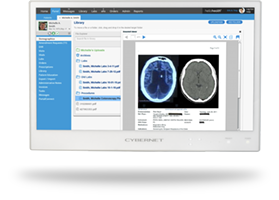When designing a computer, one of the most essential questions to answer is how to keep it cool. While most PCs rely on fans to prevent overheating, this simply isn’t an option in many operating environments.
For high-demand roles, fanless cooling systems serve in this role. Their resilience and reliability make them perfect for the medical and industrial sectors.
What is Fanless Cooling?
To better understand what is fanless cooling, we need to understand how it differs from more conventional active cooling solutions.
Active Cooling
Active cooling solutions rely on moving parts to actively move heat away from a computer’s components. This typically takes the form of spinning fans that blow hot air away and cool air toward a computer’s CPU and motherboard.
Fanless Cooling
Fanless cooling (also known as passive cooling) is just what the name implies: fanless. Instead of a moving fan, these solutions rely on specially designed heatsinks that draw heat away from the computer and radiate it out into the surrounding environment.
Benefits of Fanless Cooling
Fanless cooling solutions boast several significant advantages over active cooling, with the most important being:
Fewer Moving Parts
The most obvious benefit of fanless cooling is the lack of moving parts. Any moving part, no matter how small or insignificant, has to deal with friction and mechanical stresses. If even a single screw breaks on a cooling fan, the entire system can fail. This leads to the computer overheating and potentially destroying it. However, a fanless cooling system has no moving parts, which means fewer potential failure points.
Sealed Casings
Another major advantage that fanless cooling offers is that it enables sealed casings for computers that implement them. A computer with fans needs openings in its casing to blow hot air out and pull cool air in. This isn’t much of an issue in an office or home, but a dirty working environment like a factory floor is another story.
If dirt gets pulled into the computer or water spills inside via these openings, it can lead to serious damage or outright failure. On the other hand, a fanless cooling solution enables a sealed casing that locks out dirt and liquids.
Less Noise
The noise a computer makes is not an obvious factor during the purchasing process, but it does matter. The sound of fans constantly running can be distracting or even uncomfortable in certain scenarios. For example, a patient in a hospital needs to have their vital signs monitored by computer equipment. If that computer has constantly running fans, it can keep the patient from relaxing or sleeping.
Applications for Fanless Cooling
Fanless cooling’s simplicity and reliability make it ideal for high-demand work environments, such as those found in the medical and industrial sectors.
Medical Computers
Medical-grade computers must deal with extremely high demands in terms of reliability. 24/7 operational capability is considered a minimum requirement rather than a premium feature. Fanless cooling enables this capability by reducing the number of moving parts in the computer, which reduces the chances of a mechanical breakdown.
Computers with fanless cooling are also less likely to spread germs and are easier to clean. A fan can easily blow airborne viruses and bacteria from one patient’s room to another, spreading infections. Obviously, no fan means no spread. The sealed casings that fanless cooling enables also let healthcare providers clean and disinfect their computers without fear of damaging them.
Lastly, fanless computers are much more comfortable for use near patients. As previously mentioned, a computer with its fans running can be a distracting nuisance for patients, preventing them from getting the rest that they need. Fanless medical PCs ensure computer support without affecting patients near them.
Industrial Computers
Industrial computers also benefit heavily from integrating fanless cooling solutions. If a computer controlling machinery on the factory floor breaks down, it can cause the entire manufacturing line to halt. Fanless computers, with their superior reliability, are much less likely to break down. Removing one of the most common points of failure for computers, their fans, is just one problem that fanless PCs solve.
Industrial work environments are not known for their cleanliness either. Dirt and grime are a constant factor in work areas, which can easily damage or destroy a computer’s internal components if they get sucked in by fans. With fanless cooling, that scenario will never happen.
Computers with Fanless Cooling From Cybernet Manufacturing
What is fanless cooling? It’s a core component of making industrial and medical computers fit for their working environment. This single element makes these computers far more reliable and durable.
If you’re looking for medical or industrial computers equipped with fanless cooling solutions, contact the team at Cybernet Manufacturing. We’d be happy to explain how our fanless computers are tailor-made for your needs.

